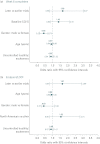Placebo-related effects in clinical trials in schizophrenia: what is driving this phenomenon and what can be done to minimize it?
- PMID: 22217384
- PMCID: PMC3405769
- DOI: 10.1017/S1461145711001738
Placebo-related effects in clinical trials in schizophrenia: what is driving this phenomenon and what can be done to minimize it?
Abstract
The effect of placebo observed in schizophrenia clinical trials represents a growing problem that interferes with signal detection for treatments, increases costs of development, discourages investment in schizophrenia research and delays the introduction of new treatments. This paper seeks to clarify key issues related to this problem and identify potential solutions to them. Differences between placebo effect and response are characterized. Recent insights into the central nervous system mechanisms of placebo effect are described. This is followed by a description of protocol/study design and study conduct issues that are contributing to a growing placebo effect in clinical trials. Potential solutions to these problems are provided.
Figures




References
-
- Benedetti F 2008aMechanisms of placebo and placebo-related effects across diseases and treatments Annual Reviews Pharmacology and Toxicology 4833–60. - PubMed
-
- Benedetti F 2008bPlacebo Effects: Understanding the Mechanisms in Health and Disease Oxford, UK: Oxford University Press
-
- Benedetti F, Colloca L, Torre E, Lanotte M. et al. Placebo-responsive Parkinson patients show decreased activity in single neurons of subthalamic nucleus. Nature Neuroscience. 2004;7:587–588. - PubMed

